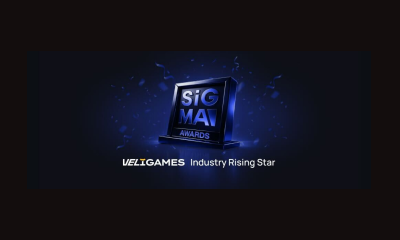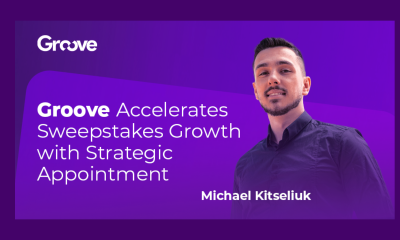Industry News
Roadmap for 2025: Core iGaming Trends

The iGaming industry grows quickly worldwide, but it also has strict regulations and an overwhelming number of companies competing for customers. Researching regularly is not something optional — it’s a necessity. Companies need market research to see upcoming trends and changes in regulations, adapt to new technology, and seize emerging opportunities. Without ongoing analysis, businesses risk falling behind in an industry where innovation and agility are critical to success.
This article draws on the expertise of Julia Panina, Head of Product Marketing at EvenBet Gaming, who headed the 2024 iGaming analysis project providing a comprehensive overview of the industry’s current landscape. This text is just a glimpse of the useful data you can find in the full report. Based on in-person surveys of over 350 industry professionals conducted at major events, EvenBet’s research offers a globally representative perspective on the sector’s most pressing issues, trends, and challenges. Research Methodology
2024 iGaming analysis uses a robust research methodology to gather feedback through face-to-face meetings with industry professionals at field events. We collected data from 353 participants at five key industry events — ICE, SiGMA Asia, iGB Live, SBC Summit Lisbon, and SiGMA Europe — to create a diverse and accurate representation of the industry. The research covers industry developments from January 1st to November 14th 2024 to create a complete picture of the iGaming industry.
The participants answered a series of multiple-choice questions and also shared their thoughts in free-form answers. Our research method combined quantitative and qualitative data to provide deeper insights into the challenges, trends, and opportunities shaping the iGaming sector.
The respondents represented a broad spectrum of the iGaming ecosystem:

In 2024, companies shifted their focus to different markets: Europe maintained its leadership with 28% while Asia came in second with 25%. Latin America took 18% of the market share, while the USA & Canada and Africa featured 12% each. Companies in Australia & Oceania made up only 3% of the market.

In terms of professional roles, CEOs led the group with 31% of responses, while sales representatives and technical specialists followed at 22% and 17% respectively. The mix of professional roles and geographic areas ensures that the findings are both comprehensive and actionable, reflecting the perspectives of decision-makers and experts across the industry.
Now, let’s explore the key findings from her 2024 analysis and their implications for iGaming stakeholders.
Regulatory Challenges Dominate the Landscape
Regulation and compliance are the top concerns for iGaming professionals, with 19% of respondents citing it as their biggest challenge. The fragmented nature of regulations across different GEOs causes heavy workloads for operators, who must navigate several legal frameworks.

Key Regulatory Changes in 2024
United Kingdom:
- Introduced stricter financial checks, deposit limits, and mandatory player surveys.
- Enhanced Due Diligence (EDD) required for players depositing over £25,000 annually.
- New slot betting limits: £5 per spin for players over 25, £2 for those under 25.
- Quarterly tax declarations now mandatory for operators.
- Online gambling taxes likely to double soon.
United Arab Emirates (UAE):
- Established the General Commercial Gaming Regulatory Authority (GCGRA).
- Operators and senior executives must apply for licences across the 7 emirates.
- The first licence issued to “The Game” for lottery activities, signalling the start of regulated gambling.
- Warnings issued against unlicensed operators, emphasising fraud risks and legal consequences.
United States:
- Plans to launch a National Self-Exclusion Program for responsible gaming.
- States like Illinois introduced progressive tax rates (20%–40%) for online bookmakers.
- Federal bill under review proposes:
- State applications to the Department of Justice for regulated betting markets.
- Advertising bans from 8 a.m. to 10 p.m., restrictions on microbets, and credit card use for deposits.
- Prohibition of AI for tracking player habits and limits on daily deposits (maximum 5 per day).
The report also covers the most significant legislation changes in Thailand, the Philippines, Brazil, and Curaçao, alongside updates from other key regions. Check out the full analysis for a comprehensive overview.
Technological Advancements Drive Innovation
The research shows that 21% of respondents now use personalised customer experiences and 18% have implemented AI and machine learning to improve player interactions and business operations.
New game mechanics and designs are also a priority, with 19% of respondents focusing on creating innovative content to stay ahead of the competition. European iGaming leaders are showing strong interest in blockchain technology as 14% of them explore its potential applications.

Expert insight:
“AI is used to personalise content, analyse player behaviour, and prevent fraud. This results in more adaptive and safer gaming environments. VR technologies and the concept of the metaverse are gradually integrating into online gambling, providing players with more immersive experiences. However, high costs and technical limitations are holding back the widespread adoption of these technologies.” Dmitry Starostenkov, CEO of EvenBet Gaming
Main Trends in Technology in 2024
AI and Machine Learning take centre stage: AI and ML stood at number three in the list of priorities, with 18% of companies adopting these technologies. AI helps companies deliver customized services while making their operations more effective.
Regional focus: CEOs in Asia lead the way with AI and machine learning technology implementation at 29%, the research showed. 21% of companies focus their efforts on creating unique experiences for their customers. European leaders prioritise customer experience customisation at 25% while AI and machine learning receive 20% of their focus. This regional divergence highlights differing priorities in technological adoption across the iGaming industry.
Blockchain gains traction in Europe: European CEOs demonstrate a stronger interest (14%) in blockchain technology than their Asian counterparts (7%) likely because Asian markets adopted it earlier.
Limited adoption of VR and Metaverse: Asia’s iGaming companies use these technologies more often than their European counterparts by 7% to 3%. These technologies create deep immersive experiences, but expensive setup and performance issues prevent them from reaching many users.
Content innovation remains paramount: online operators take the lead (23%) by creating fresh game mechanics to compete effectively in the market. Land-based operators put equal emphasis on creating new mechanics and new designs at 22% each. The providers work directly with operators to create fresh game mechanics and design elements that meet customer preferences (21% of their efforts). This shared emphasis on content innovation highlights its critical role in driving player engagement and market differentiation.
Personalisation drives engagement: personalisation stands as the leading priority for all regions, with 18% of companies already using these methods. Payment providers take the lead with 33% in this area, while affiliates follow with 19%.
Expert insight:
“I have noticed a couple of changes compared to the previous year: the focus in innovation adoption has shifted from mobile platforms and online casinos to actively implementing artificial intelligence (AI) to enhance the user experience.
Another is a stronger emphasis on responsible gaming. While this topic received less attention last year, it has become a top priority in 2024 due to the increase in addiction cases and pressure from regulators.” Dmitry Starostenkov, CEO of EvenBet Gaming
Talent Acquisition and Retention Challenges
CEOs in iGaming struggle to find qualified professionals for their teams, which ranks as the third most pressing concern with 13% of the votes. Finding local experts who match both professional standards and company dedication proves challenging in emerging markets.

Interestingly, Affiliates stand out as leaders in three challenge categories: Competition, Adaptation to new markets, and Fraud.
Many companies face difficulties because people claim local market expertise without proper qualifications. Many candidates, especially in African markets, seem skilled but cannot fulfil their commitments. To address this, companies now set up physical offices in new markets while sending parent company representatives to these locations. However, finding suitable employees who will move to new locations and adjust to different environments makes the hiring process even more challenging.
How to Attract Top Talent in iGaming
To hire top iGaming professionals, a company needs more than just competitive salaries. The survey revealed that both high salaries and working for a dynamic and expanding company equally motivated job-seekers (19% of respondents). People in this quick-paced industry want to develop their skills while creating new ideas and helping their company succeed and change.

Brand recognition holds importance for 17% of respondents but does not determine their final decision. Employers need to show potential hires the existing team dynamics, growth opportunities, and available support at work. The survey results show that 16% of respondents prefer the option to work remotely because more people now seek workplace flexibility.
However, there’s a gap between what CEOs perceive as attractive and what employees truly value. CEOs understand the need for a professional and supportive team (28%), but they place too much weight on brand recognition (20%) and too little importance on competitive salaries (17%). To bridge the gap, companies need to match their recruitment messages with what employees want by showing both good pay and opportunities for growth and creativity.

What Can We Expect in 2025?
The iGaming sector will experience major changes in 2025, driven by technological advancements, evolving regulations, and shifting market dynamics. For this section, we have condensed the expert predictions into bite-sized insights.
Diversity and Inclusion Take Center Stage
More women and people from different backgrounds will take leadership and technical roles in iGaming, which brings more innovation and inclusivity in a traditionally male-dominated industry.
Technological Innovation Drives Growth
AI technology and blockchain will help companies deliver customised gameplay, while machine learning and blockchain will protect player data and payments. Developments in game mechanics and bot detection technology will help multiplayer platforms work better.
Expansion into Emerging Markets
Businesses will expand into Latin America Africa and the UAE while hiring local talent and following new regional regulations and licencing rules.
Regulatory Adaptation and Compliance
Flexibility in responding to new regulations will be essential to avoid penalties and maintain licences. Compliance experts will be in high demand to navigate these changes.
Shift in Marketing Strategies
Public and private events will stay the key marketing channels, but vendors must choose their events carefully because of rising competition. B2B businesses will use omnichannel marketing combined with AI personalisation and share thought leadership content.
Talent Acquisition and Retention
Companies will need more tech and compliance experts, while placing greater emphasis on hiring employees who can communicate and solve problems effectively. Companies will focus on keeping their employees by providing career growth opportunities alongside creating welcoming work environments and promoting employee well-being.
Localisation and Customer Experience
Companies need to create content that matches local preferences and run market-specific offers alongside culturally relevant marketing to win trust and customer loyalty in both emerging and traditional markets.
Consolidation and Collaboration
Smaller operators will partner with bigger networks to streamline operations and stay competitive, while brands will make focus on creating seamless customer experiences across all channels.
Best Practices and Takeaways
Based on Julia’s analysis, here are some actionable recommendations for iGaming stakeholders:
- Understand regulatory frameworks: Research current and future requirements in the industry. Companies that enter the market first, as happened in Brazil, earn advantages before official legalisation takes effect.
- Comply with marketing rules: Learn the specific rules that control marketing in your target area. Brazil bans gambling ads that promise fast and easy money.
- Evaluate marketing budgets: Assess the budget required for your target market while using cash flow from existing regions to fund new projects.
- Leverage local insights: Team up with local organisations and cultural experts to design marketing plans that work for each region. Test your localised content with native speakers to prevent cultural errors.
- Hire local talent: Hire local experts who are genuinely invested in your company’s success. Working with local businesses simplifies market entry and helps you meet regulatory requirements.
- Choose effective communication channels: Determine which channels work best for your business, such as WhatsApp in Colombia or roadside ads in some African countries.
- Analyse competitors: Study how much competitors invest in their business and what market share they control. For example, the U.S. landscape shows how a few operators hold 80% of the market. Invest in proper research to avoid overestimating your entry chances.
- Adapt your brand: Make sure your brand name connects with local customers. Develop a new brand identity that stands apart from any negative associations.
- Customise your product: Adjust your product to match local market requirements. Study the audience profile, choose appropriate colours and game types, as well as use native languages and local payment methods.
- Build Trust Through Support: Build complete customer support systems that use physical locations and local call centres when necessary. Build lasting relationships with customers instead of seeking fast returns.
Conclusion
EvenBet Gaming’s Head of Product Marketing Julia Panina conducted a thorough 2024 iGaming market study that features a comprehensive overview of the industry’s current state and future direction. From regulatory challenges and market shifts to technological innovations and talent acquisition, the insights from this research are invaluable for anyone looking to succeed in the iGaming sector.
Please note that the full report goes beyond the scope of this brief summary: actionable data, technical information, and expert commentary. Download the full document to see the full picture of the iGaming industry.
At EvenBet Gaming, we are committed to staying at the forefront of industry trends, and Julia’s work is a testament to that. As we look ahead to 2025, we are excited to continue supporting our partners and clients with innovative solutions and data-driven strategies.
The post Roadmap for 2025: Core iGaming Trends appeared first on European Gaming Industry News.
AI
Despite AI’s Rise, Fraud Teams Keep Growing — SEON 2026 Report

SEON, the command centre for immediate Fraud Prevention and AML Compliance, has unveiled AI Reality Check: 2026 Fraud & AML Leaders Report, the second iteration of its sector research, derived from a worldwide survey of 1,010 leaders in fraud, risk, and compliance spanning payments, fintech, financial services, retail, eCommerce, and gaming.
The figures reveal an unforeseen narrative: AI is ubiquitous, yet operations are not becoming easier to manage. Currently, 98% of organizations utilize AI in fraud and AML processes, with 95% expressing confidence in its effectiveness; meanwhile, headcount plans rose from 88% to 94% year-over-year, and 83% anticipate budget increases in 2026.
Complexity Is Surpassing Automation
AI has not lessened the workload — it has revealed the extent of work that has always existed. Fraud losses are increasingly approaching revenue growth, threats are advancing more rapidly, and disjointed systems restrict the true potential of AI at scale. Key year-over-year shift:
Leadership’s confidence in their teams’ performance is lagging. The number of leaders who disagreed with the statement, “fraud losses are growing faster than revenue,” dropped by almost 40% from the previous year
Inside the Numbers:
AI is baseline, not experimental
- 98% already integrate AI into daily workflows (only 2% still planning)
- 95% are confident AI can detect and prevent fraud (52% very confident)
- Top use case: AI/ML for transaction monitoring (30%)
Fraud and AML investment keeps climbing
- 83% expect fraud/AML budgets to increase in 2026
- 94% plan to add at least one full-time hire (up from 88% in 2025)
- 85% plan to add a vendor, 49% plan to replace one
Fragmentation is the bottleneck
- 95% claim “some integration” between fraud and AML systems
- Only 47% run fully integrated workflows; the rest rely on partial connections
- 80% say getting a unified view of data is challenging
For many, time-to-value remains slow
Only 10% go live in under two weeks
38% take 1–3 months, 24% take 4+ months
When implementations run long, top impacts include increased costs (52%) and prolonged fraud exposure (47%)
Teams are growing, not shrinking
94% plan to increase headcount despite automation gains
85% see AI agents as support/augmentation, not replacement (only 12% see eventual replacement)
Top fraud threats reported:
- Account takeovers: 26%
- Promo/discount abuse: 18%
- Return fraud: 18%
“Fraud and financial crime were supposed to become more manageable as AI matured,” said Tamas Kadar, CEO and co-founder, SEON. “Instead, 2026 is the year leaders are confronting a more complicated reality. AI adoption is real, confidence is high, but the scale and pace of fraud — compounded by fragmented systems — continue to drive increased investment rather than reduced overhead. The bottleneck is no longer whether AI works. It’s everything around it: disconnected data, siloed teams, slow implementations. The organisations that pull ahead will be the ones that unify fraud and AML intelligence, shorten the distance between threats and controls, and treat integration as strategy, not plumbing.”
Fast-Growing Companies Invest in Integration Early
Organisations growing 51%+ are nearly twice as likely as slower peers to report that achieving unified visibility is “not very challenging.” They treat integration as infrastructure, not an IT project.
What’s Next: From “Does AI Work?” to “Can We Trust It?”
With adoption near-universal, the conversation is shifting to governance, explainability and accountability:
- 78% say decentralised digital identity will become central to fraud/AML
- 33% cite data privacy regulations (GDPR, CCPA) as the biggest external force shaping AML
- 25% point to criminals’ advancing use of AI and obfuscation techniques
The post Despite AI’s Rise, Fraud Teams Keep Growing — SEON 2026 Report appeared first on Eastern European Gaming | Global iGaming & Tech Intelligence Hub.
Ashley McCulloch Vice President North America at Evoplay
Evoplay Names Ashley McCulloch Vice President North America

Evoplay, the acclaimed game development studio, has named Ashley McCulloch as Vice President North America, strengthening its strategic emphasis on growth throughout the US and Canada.
McCulloch has over 15 years of experience that includes land-based, VLT, and online gaming. She has occupied high-level commercial positions at IGT and Light & Wonder and most recently worked as Director of Account Management North America at Inspired Gaming Group, where she led strategic account development and assisted with new market entry projects.
In addition to her commercial success, McCulloch serves as a board member for Women in Sports and Events, is part of Global Gaming Women, and was recognized in the 2024 Emerging Leaders in Gaming 40 Under 40, highlighting her influence in the industry.
At Evoplay, McCulloch will lead partnerships, regulatory licensing, product launches, and broader business development efforts as the provider speeds up its growth in the North American market.
Evoplay has secured a significant presence in the area, launching in Ontario via collaborations with prominent operators in the province, such as BetMGM and Caesars Entertainment.
In November 2025, Evoplay made a notable initial move into the United States by joining the lottery sector in Washington DC, establishing a connection to the US online gaming landscape.
With McCulloch’s hiring, the company aims to leverage this momentum and continue its expansion throughout regulated US states.
Ivan Kravchuk, CEO at Evoplay, said: “North America represents one of the most exciting growth opportunities for Evoplay, and Ashley McCulloch’s appointment is a major step forward in realising our ambitions in the region.
“Her extensive experience across land-based and online gaming, combined with her track record in commercial strategy, makes her the ideal person to lead our efforts as we scale.”
Ashley McCulloch, Vice President North America at Evoplay, added: “I’m very excited to be joining the Evoplay team at such a pivotal moment in its growth journey.
“The studio has built a strong reputation for high-quality content, and I look forward to developing partnerships and driving sustainable growth across North America.”
The post Evoplay Names Ashley McCulloch Vice President North America appeared first on Eastern European Gaming | Global iGaming & Tech Intelligence Hub.
Africa
VeliGames Secures SiGMA Africa’s Industry Rising Star Award

VeliGames, a game aggregation platform from VeliTech, has received the Industry Rising Star award at the SiGMA Africa 2026 Awards, highlighting the platform’s swift innovation and significant influence on African iGaming.
The Industry Rising Star award highlights a developing company that displays remarkable potential, creativity, and influence, rapidly positioning itself as a forthcoming leader in the iGaming sector. It emphasizes VeliGames’ dedication to providing not just a content pipeline, but also genuine innovation and a comprehensive growth engine for operators in developing markets.
“Winning the SiGMA Africa Award for Industry Rising Star 2026 is a proud moment for our team. From day one, we built VeliGames with African operators in mind, combining local-fit content, practical tooling, and pricing that makes sense on the ground. We back it all up with hands-on operational know-how from working in the region. That’s what being a true content partner looks like.” Irakli Kakhidze, CEO at VeliGames.
Tailored for Africa’s infrastructure challenges, device characteristics, and user habits, VeliGames provides a performance-oriented casino content layer aimed at thriving in areas where conventional, high-bandwidth aggregation methods struggle. Rather than solely competing based on catalogue size, VeliGames prioritizes the key factors that genuinely contribute to casino success in Africa: speed, accessibility, conversion, and session stability.
The platform delivers content in a highly efficient, mobile-centric setting designed to function dependably amid variable connectivity, restricted device storage, and brief gaming sessions, assisting operators in ensuring seamless gameplay and enhanced player experiences on a larger scale.
Alongside curated third-party titles, the platform includes exclusive in-house content:
- VeliPlay: bold, crash-and-fast titles built for immersion, retention, and high replay value
- Heaven of 7: high-impact slot content designed for strong engagement, session after session
Visit VeliTech at Stand 096 from March 3-5 to learn why VeliGames was honored as the Industry Rising Star. Discover live game demonstrations, witness performance features in action, and learn how operators can create unique iGaming brands with a platform designed for regional requirements.
The post VeliGames Secures SiGMA Africa’s Industry Rising Star Award appeared first on Eastern European Gaming | Global iGaming & Tech Intelligence Hub.
-

 Comatel6 days ago
Comatel6 days agoCOMATEL CELEBRARÁ UNA FIESTA PARA CIENTOS DE OPERADORES TRAS FINALIZAR EL PRIMER DÍA DE LA FERIA ESPAÑOLA, INTERAZAR
-

 Fotini Matthaiou7 days ago
Fotini Matthaiou7 days agoOctavian Gaming Titles Go Live with Novibet in Mexico
-

 Compliance Updates7 days ago
Compliance Updates7 days agoSpillemyndigheden: New Guidance on Responsible Gambling
-

 Amusnet7 days ago
Amusnet7 days agoAmusnet Introduces its “Jackpot Cards Plus” Island at Casino Adjara
-

 Fast Track7 days ago
Fast Track7 days agoFast Track Spark Lands in São Paulo for Advanced Retention Workshop
-

 Betting and Gaming Council7 days ago
Betting and Gaming Council7 days agoBGC: Government Tax Hike Boost for Black Market
-

 Canada4 days ago
Canada4 days agoPointsBet Canada to Contest Proposed 5-Day Suspension by AGCO
-

 Africa3 days ago
Africa3 days agoEGT showcases African growth strategy at SiGMA Africa 2026































